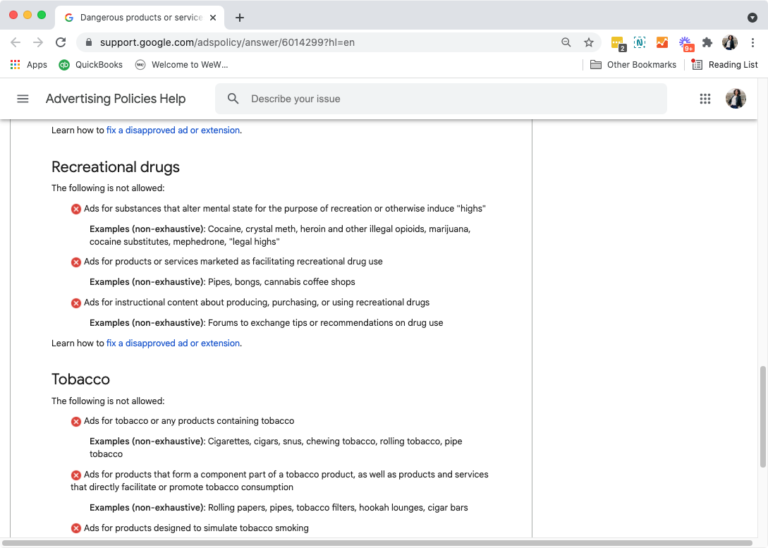
(Editor’s note: This story is part of a recurring series of commentaries from professionals connected to the hemp industry. Daniela Furtado is managing director and SEO consultant at Findable Digital Marketing, a cannabis SEO agency based in Toronto.)
Google is a powerful tool for businesses, and ranking top three in a search can bring an influx of sales. Unless you’re selling hemp or marijuana.
Google doesn’t prohibit advertising cannabis on its platforms, but there are strings and loopholes.
What Google says
Let’s go through the fine print of Google’s advertising policy:

Google does not permit ads that promote the use, sale or even provide informational content about cannabis.
It doesn’t matter if it’s medicinal or recreational, the tech beast doesn’t make a distinction and lumps it all as a recreational drug in its Advertising Policy.
In theory, this also includes CBD and hemp.
However, since 2019, Google has been running closed-test programs for selected CBD companies.
Willing to take the risk? The loophole.
Despite Google’s policies, cannabis businesses manage to sneak their way through the algorithm and get their ads approved. Search “dispensary near me” and you’ll probably get an ad or two.
Cannabis businesses often ask me – how do they do it? See, there’s a loophole.
There are three things you need to submit a Google ad:
- Ad copy.
- A landing page.
- A list of bidding keywords.
The trick to getting your ads approved is to bid for cannabis-related keywords but avoid using them in your ad and website copy.
Here are some examples of trigger words:
- Marijuana.
- Weed.
- Cannabis.
- Hemp.
- CBD.
- Vapes.
- Pipes.
- Rolling paper.
- Dispensary.
In other words, you can bid for the word “CBD,” but you should avoid using it in your ad copy or your entire website.
Making such changes to your website is a headache and a half. What’s more, this usually means that you can’t organically rank with SEO and run Google Ads at the same time because the two mediums contradict one another.
To work around this, many companies will use alternative words like “flower.” Instead, they may use emojis or some go as far as creating a separate website.
For e-commerce, the same policies and loophole apply to Google’s other product, Google Retail Merchant.
Now, be warned. Companies that cheat the algorithm can face consequences if caught. Google can disapprove your ad, reduce your visibility if approved, and if you persist, Google can suspend your account altogether.
Alternatives to Google ads
Let’s consider your alternatives.
One is running display advertising or direct-to-publisher advertising. That is, you buy banner ad space from Google Ad Sense or you can negotiate a sponsored campaign directly from a third-party website or publisher.
Your other option is using organic means like email, SEO and public relations to drive traffic to your website. Some Google products that are fair game include Search and Images, News and My Business.
What’s great about organic digital marketing is that it “prepares” you for the day Big Tech, like Google and Facebook, ever changes their policies to be cannabis-friendly.
What does it mean to be “prepared”?
The more website traffic you get, the more data Big Tech has at its disposal. The more data they have, the better your ads will perform and the lower your cost-per-click (CPC).
In the marketing world, this is known as maturing your Facebook pixel or increasing your Google Ads quality score.
The Future of Google and cannabis
A common question I get is: “Do you think Google and Facebook will ever be cannabis-friendly?”
Yes, I’m optimistic. As more American states and corporations change their policies, I’m confident that Big Tech will eventually follow suit.
What I’m most curious to see is how cannabis advertising policies will change.
Like pharmaceutical drugs and alcohol, I think there will always be constraints and barriers to advertising cannabis online, but will the rules be clear and consistent? That remains to be seen.
Daniela Furtado can be reached at [email protected].

